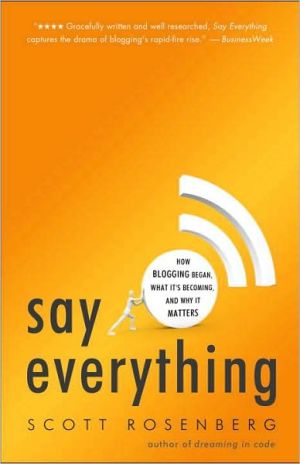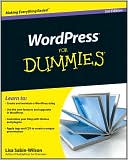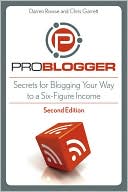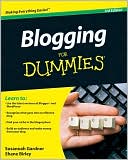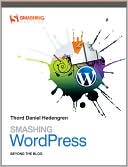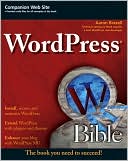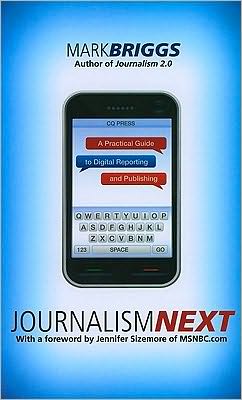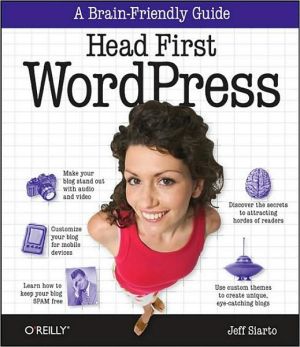Say Everything: How Blogging Began, What It's Becoming, and Why It Matters
Blogs are everywhere. They have exposed truths and spread rumors. Made and lost fortunes. Toppled cabinet members and sparked grassroots movements. Immediate, intimate, and influential, they have put the power of personal publishing into everyone's hands and created a new public sphere-one in which we can think out loud together. In Say Everything, Scott Rosenberg chronicles the birth of this new medium, tracing its impact on politics, business, media, and our personal lives. He offers...
Search in google:
Blogs are everywhere. They have exposed truths and spread rumors. Made and lost fortunes. Brought couples together and torn them apart. Toppled cabinet members and sparked grassroots movements. Immediate, intimate, and influential, they have put the power of personal publishing into everyone s hands. Regularly dismissed as trivial and ephemeral, they have proved that they are here to stay.In Say Everything, Scott Rosenberg chronicles blogging s unplanned rise and improbable triumph, tracing its impact on politics, business, the media, and our personal lives. He offers close-ups of innovators such as Blogger founder Evan Williams, investigative journalist Josh Marshall, exhibitionist diarist Justin Hall, software visionary Dave Winer, "mommyblogger" Heather Armstrong, and many others. These blogging pioneers were the first to face new dilemmas that have become common in the era of Google and Facebook, and their stories offer vital... The Barnes & Noble Review Queen Victoria would not have been amused. We live in a confessional age in which authenticity demands saying everything about oneself. From politicians to celebrities to ordinary people, mainstream culture is increasingly self-revelatory. Reality television, call-in radio, and millions of self-published personal electronic diaries known as "blogs," have become the most popular vehicles of this confessional culture. Why is this? In Say Everything Scott Rosenberg quotes Nick Denton, the founder of the New York City–based blog Gawker who, in explaining the value of 9/11 blogs said, "Only through the human stories of escape or loss have I really felt the disaster." The point of media, Denton implies, is to "feel" rather than "explain." The old industrial model of professional journalists handing down coldly objective information is being shoved aside by a hyper-democratic experiential model in which everyone publishes their feelings about everything. And the most experiential of all modern media confessionals is the Internet blog -- of which there were 64 million in 2008. Rosenberg, a cofounder of the Internet magazine Salon, really does say almost everything (even a little too much) about the blogging revolution. With patience and not a little love, Rosenberg introduces us to the crazy panoply of blogging founding fathers: virulent anti-Semite John Barger, a brilliant yet prickly software programmer with a Socratic obsession about truth called Dave Winer, and the first blogger, Justin Hall, who, in celebrating the new year in 2005, blogged: "I really enjoy urinating." But blogs aren't just the refuge of the mentally ill. Over the last ten years, more and more writers have embraced the blog: Rosenberg explains that in everything from politics to sex to "mommy" blogs, the experiential self-published Internet diary has gone mainstream, turning blogging's "great outpouring of human expression" into the future of all media. Rosenberg criticizes mogul Barry Diller for suggesting that talent remains the one scarcity in today's media. But this book is a glitteringly subversive argument against Rosenberg's own thesis. It's a beautifully written and meticulously fair narrative about the past, present, and future of the blog. Only somebody with Rosenberg's incomparable ability could have written Say Everything. We are lucky to have his unique talent. --Andrew Keen
Say Everything\ How Blogging Began, What It's Becoming, and Why It Matters \ \ By Scott Rosenberg \ Crown\ Copyright © 2009 Scott Rosenberg\ All right reserved.\ ISBN: 9780307451361 \ \ \ Chapter 1\ \ PUTTING EVERYTHING OUT THERE\ \ Justin Hall\ \ In 1994, Justin Hall invented oversharing. Of course, we didn't have a name yet for the compulsion to tell the online world too much about yourself. Back then, Hall was just an eccentric nineteen-year-ld college student who recorded minutiae of his life on his personal website; no one knew that the self-revelation he found so addictive would one day become a temptation for millions.\ \ Beginning at the dawn of the Web, Hall parked himself at the intersection of the Bay Area's remnant counterculture and Silicon Valley's accelerating economy and started writing down everything he saw. His website, at www.links.net, became a comprehensive personal gazette and archive, full of ephemeral details and intimate epiphanies, portraits of the Web's young builders and nude pictures of himself.\ \ Hall, who is fair and thin and lanky--he looks a bit like one of Tolkien's elves--has the affable grin of someone who is fully at ease with strangers. If you took away his nonconformist streak, he could make a great salesman. You could even see him running for office and winning, in some alternate dimension where no one cared that he'd littered the public record with radical opinions and accounts of his illegaldrug use, or that he frequently undermined his considerable charisma by intentionally irritating people. He often begins public speaking engagements by stepping to the podium, facing his audience, and silently beaming as the seconds tick by and the crowd begins to wonder what's going on. He seems perfectly comfortable making other people uncomfortable.\ \ For more than a decade, Hall's site had presented an open window onto his life. "It's so much fun," he'd say, "putting everything out there." January 2005 seemed no different. He kicked off the new year with a blunt four-word post: "I really enjoy urinating." He told the story of a mustache-growing competition with a friend. He mentioned meeting "a smart, motivated gal" who wanted to collaborate on a story involving angels.\ \ Then, in the middle of the month, the window slammed shut. All signs of the layers upon layers of Hall's personal history stretching back to 1994 were gone. In their place was a little search box and a fifteen-minute video titled Dark Night.\ \ The video, which is still available on YouTube, opens with Hall's face, half in shadow, filling the frame. He begins: "What if inti--" Then he cuts himself off as his bleary eyes widen. He looks away, lets out an exasperated breath, and starts over:\ \ So what if intimacy happens in quiet moments and if you're so busy talking and searching and looking and crying and yelling and--then you won't ever find it.\ \ A subtitle appears below Hall's face: "I sort of had a breakdown in January 2005."\ \ Hall was an accomplished storyteller in his own callow, motor-mouthed way. But this story emerged only fitfully, in raw fragments. Hall, it seemed, had met a woman. One who "opened me up like crazy." He'd fallen head over heels. Bliss! But the new relationship had clashed, somehow, with his confessional writing on the Web. His new beloved, Hall hinted, didn't relish the glare.\ \ What if a deeply connective personal activity you do, that's like religion, that you practice with yourself, that's a dialogue with the divine, turns out to drive people away from you? . . . I published my life on the fucking internet. And it doesn't make people wanna be with me. It makes people not trust me. And I don't know what the fuck to do about it . . .\ \ Dark Night played out its psychodramatics with Blair Witch-style lighting and confessional ferocity, like an Ingmar Bergman therapy scene reshot by a geeky art student. The video was awkward, sometimes embarrassing, and more than a little unnerving. It made you fear for Hall's mental state--you wanted to pick up the phone and talk him down from the ledge. Still, for all its raw atmospherics, it was hardly naive. Hall had been creating autobiographical media all his life, and most recently he'd been studying filmmaking at USC. Dark Night was, in its own ragged way, a calculated work, not some piece of "turn on the camera, then forget about it" verite.\ \ It wasn't the soul-baring that made Dark Night a shocker. Rather, it was the prospect that Justin Hall's soul-baring days might be at an end. On the subject of self-exposure, Hall had always been an absolutist. When he began writing on the Web, the word transparency hadn't yet been drafted into service in its contemporary meaning: openness, no secrets, all questions answered. But transparency had been Hall's guiding principle from the start. He had turned his website into a glass house.\ \ Only now, it seemed, he no longer wanted to live there.\ \ In 1988, when Hall was thirteen, he got his first glimpse of the Internet. He'd already been online a few years, dialing up private bulletin-board services (BBSes) from his mom's computer in their Chicago home, looking for videogame tips, and sticking around to enjoy the camaraderie. The fun of tapping into a national BBS based in California ended quickly when his mother looked at the phone bill; from then on, hometown boards would have to do.\ \ Hall's father was gone. An alcoholic, he'd killed himself when Justin was eight, a story Justin would later tell, prominently and unflinchingly, on his site. His mother, a successful lawyer, worked long hours and traveled a lot, so he was, as he put it, "raised by a series of nannies." In 1988 a new one arrived, a medical student at Northwestern who saw Justin's enthusiasm for going online and showed the youngster the nascent Internet, then a university-only enclave. (This was well before the Web's easy-to-use interface tamed the technical difficulties of using the Internet for the masses; it took geek tenacity just to connect.) "It wasn't just a bunch of fifteen-year-olds in Chicago on their computers," Hall says. "It was people all over the country. And the scope of what the people were talking about was fantastic." His gaze was drawn to Usenet, the collection of Internet-based forums that, in the pre-Web days, offered the most reward to an adolescent looking for online kicks. "People were getting nerdy there," Hall recalls, "about this specific Frank Zappa record, or this specific transgender bent, or this specific drug experience. I was extremely turned on."\ \ Hall called the university and tried to get an Internet account for himself. Sorry, he was told, we don't just give them out. What does a teenager do in such circumstances? A teenager borrows a friend's password. But the Northwestern system administrators eventually figured out what Hall was up to and kicked him off.\ \ Hall finally got his own Internet account when he went off to Swarthmore in September 1993. The dorm rooms there had just been networked; for Hall, this meant "up-all-night information." That December, John Markoff, the New York Times technology reporter, wrote an introduction to the new World Wide Web and the Mosaic browser, describing them to his readers as "a map to the buried treasures of the Information Age." Hall read the article--on paper--and then went and downloaded Mosaic. "It was hugely exciting. Now you can use a mouse to get to all this information! Now you can put pictures and text on the same page!"\ \ At that early date, the experts, and the money, agreed that the future of online communication was in the hands of the "big three" commercial online services (America Online, Compuserve, Prodigy); technology giants, such as Microsoft, Apple, and IBM; and cable companies like Time Warner, which were sinking fortunes into interactive TV. The Internet had been a backwater accessible only to eggheads and nerds; it was hard to get on to, hard to use, and its nether regions, like Usenet, were uncensored and untamed. The whole thing was simply not ready for prime time.\ \ That was precisely what attracted Justin Hall. "The big online services always felt like a magazine stand at a grocery store, whereas Usenet felt like Telegraph Avenue in Berkeley," he remembers. "Then when I saw the Web I knew I had to try it, because the quality of pages that I saw made me think it couldn't be expensive or hard to put them up."\ \ On January 22, 1994, Hall put up his first Web page. He published it by downloading a free server program and running it on his Macintosh Powerbook 180 laptop plugged into Swarthmore's campus network. Like so much of the early Web, "Justin's Home Page" warned visitors that it was "under construction," and most of its information was about its own technology--including a list of the tools Hall had used to put it together. But if you scrolled down a bit you'd find, nestled under the header "Some Personal Shit," a photo of the long-haired Hall smirking next to Ollie North. Also a couple of links to bootleg recordings of two bands, Jane's Addiction and Porno for Pyros. And, finally, a strange black-and-white UPI photo of Cary Grant popping a tab of LSD into his grinning-wide mouth.\ \ Writing about yourself was not unknown on the Web, even at that point, and neither was cataloging your offbeat obsessions. Hall says that in his early postings he took inspiration from a site created by a programmer at the University of Pennsylvania, Ranjit Bhatnagar. Beginning in November 1993, "Ranjit's HTTP playground" provided offbeat links, along with a "lunch server." Each day, Bhatnagar would carefully record what he'd had for lunch. The page was, of course, in reverse chronological order. Although the "lunch server" was as much a pun as anything else, it foreshadowed a future in which people would use blogs to record all manner of quotidian data points.\ \ If Hall was not the very first person to build a funky personal site, he was the first to find a wide audience. His site, which he soon renamed Justin's Links from the Underground, gained speedy notoriety. This was partly because it provided valuable "what's new?"-style listings with an emphasis on the unconventional, including an inevitably popular list of sex-related links (most of which look charmingly tame compared to today's pornographic Web). Hall took pride in his link-connoisseurship; he wouldn't link to the front page of sites that had already made it on the NCSA What's New page, but he might point his readers to some noteworthy tidbit he'd found a few levels down on one of those sites.\ \ Hall promoted his new site, submitting it to anyone and everyone who was maintaining lists of websites. Links from the Underground's popularity also owed something to all that up-all-night energy Hall invested in frequent site updates. But mostly, people flocked to Links from the Underground for its lively personality. It may at times have been sophomoric, self-indulgent, or gross, but it was never boring.\ \ In 1994 the Web party was just starting up, but it was evident to Hall that he'd have an easier time joining it in the San Francisco Bay Area than in Chicago or Pennsylvania. Once, back in Hall's high school days, his eye had been caught by an ad, shouting in neon across the full length of the side of a bus, for a new magazine called Wired. He picked up a copy at Tower Records and fell in love. "I'd been working at a software store, so I knew all about computer magazines, but this one had people on the cover. So the first day I got it I actually called and left a voice mail for [editor] Louis Rossetto. 'Your magazine is awesome. My name is Justin, I live in Chicago, and I can connect you to the hacker pirate underground scene and the BBSes.'"\ \ "Oddly," Hall deadpans, "he never called me back."\ \ At Swarthmore, Hall once again took aim at Wired; he set his heart on a summer internship at the magazine's San Francisco office. He phoned each department at the magazine in turn. "It was like, give me the custodial department--I'll empty trash cans! I just wanna be around. And they're like, no. No, no, no." Finally he asked for the online department, which was then in the early stages of planning a commercial website called Hotwired. The woman he got on the line, Julie Petersen, suggested he email her with the address of his website; he said, "Why don't you look at it right now?" She typed in the URL, and then he heard her laugh--she'd found the photo of Cary Grant dropping acid. He got his interview, and later his internship.\ \ When the Hotwired crew gathered for an introductory Thai dinner, Hall found himself seated next to the editor of the site, Howard Rheingold, the veteran of the venerable WELL online forum and author of The Virtual Community. Rheingold turned to the teenager next to him and asked, "What brings you to Hotwired?"\ \ Hall looked him in the eye solemnly and replied, "The opportunity to work with you."\ \ Later Rheingold wrote, "Either the guy was such a brazen suckup as to be a genius of the genre, or he was a wiseass who was laying on the irony, or he just said the first thing that came into his mind. In any case, I went for the straightforward audacity of it. He sure blew my icebreaker to oblivion."\ \ At Hotwired, Justin Hall found a community of partners in audacity. No longer a lone webhead, he was now surrounded by other ardent geeks. Yet even in such company he was a rarity: at the ripe age of nineteen, he was already a Web veteran. He had plenty of hands-on experience in building a widely visited site--but none in navigating the labyrinth of the business world.\ \ Hotwired's birth was difficult. As the October 1994 launch neared, Rossetto began to realize how important the site would be for the future of the magazine, and he seized control of the project from Rheingold and Jonathan Steuer, Wired magazine's original online leader. Rheingold had imagined a "global jam session," but Rossetto wanted something less funky and more flashy. To Rheingold, the Web was about community; Rossetto saw it as a brand extension. Hotwired would feature the Web's first banner ads, and Rossetto decided to require visitors to register before accessing its pages, to gather demographic data for the advertisers. The young idealists at Hotwired, including Hall, saw the registration requirement as an abomination. In their view, Rossetto was selling out the Web's populist patrimony for a mess of marketing pottage. He dismissed their perspective as one big stoner pipe dream and declared that "the era of public-access Internet has come to an end." Despite the proclamation, Justin's Links, a one-person operation with zero commercial ambition, remained better known and (at times) attracted more visitors than Hotwired did during its first year.\ \ At that point in the Web's evolution, if you wanted to post a personal website, it was understood that it would take the form of Your Home Page--a little personal bio, maybe links to some stuff you'd written, maybe some more links to other sites you liked, perhaps a photo of you or your cat. \ \ Continues... \ \ \ \ Excerpted from Say Everything by Scott Rosenberg Copyright © 2009 by Scott Rosenberg. Excerpted by permission.\ All rights reserved. No part of this excerpt may be reproduced or reprinted without permission in writing from the publisher.\ Excerpts are provided by Dial-A-Book Inc. solely for the personal use of visitors to this web site. \ \
Introduction: What's New 1Part 1 PioneersChapter 1 Putting Everything Out There Justin Hall 17Chapter 2 The Unedited Voice of a Person Dave Winer 46Chapter 3 They Shall Know You Through Your Links Jorn Barger 74Part 2 Scaling UpChapter 4 The Blogger Catapult Evan Williams Meg Hourihan 101Chapter 5 The Rise of Political Blogging Josh Marshall 131Chapter 6 Blogging for Bucks Robert Scoble Nick Denton Jason Calacanis 165Chapter 7 The Exploding Blogosphere Boing Boing 198Chapter 8 The Perils of Keeping it Real Heather Armstrong 229Part 3 What Have Blogs Wrought?Chapter 9 Journalists vs. Bloggers 269Chapter 10 When Everyone has a Blog 301Chapter 11 Fragments for the Future 328Epilogue: Twilight of the Cynics 352Author's Note and Acknowledgments 361Notes 363Index 395Pointer to the Online Postscript 405
\ Kirkus ReviewsSalon co-founder Rosenberg (Dreaming in Code: Two Dozen Programmers, Three Years, 4,732 Bugs, and One Quest for Transcendent Software, 2007) offers an elegantly accessible history and defense of a now-ubiquitous Internet phenomenon-the blogosphere. In 2003 there were 100,000 blogs worldwide; today there are approximately 184 million. Such phenomenal growth of blogging, which the author defines as "a hybrid of traditional publishing and casual electronic messaging," was initially due to adventurous, and at times decidedly odd, men and women who both saw the potential in the totally free expression blogging allows and developed the software that made it simple and easy. Rosenberg energetically chronicles these '90s pioneers, including Justin Hall, who obsessively posted a real-time archive of his life in the early '90s; Evan Williams and Meg Hourihan, who developed a simple program-subsequently sold to Google-that made blogging accessible to anyone (Williams would later develop Twitter); Robert Scoble and others, who showed, for better or worse, that blogging could be profitable; and Josh Marshall, who made blogging a true journalistic endeavor. As more people have discovered the joys of blogging, what has been created, Rosenberg claims, is nothing less than "a new kind of public sphere, at once ephemeral and timeless, sharing the characteristics of conversation and deliberation." Blogging allows for new possibilities in form and content and the blossoming of new talent; it's also fun. Yet Rosenberg also acknowledges the critiques of such an unbridled flood of verbiage. With patient detail-and for the most part jargon-free language-he addresses the concern that the blogosphere is nothingmore than a mindless morass of trivia-that it may be creating an "echo chamber effect" where we talk to only those who agree with us, and may lead to cultural disintegration as millions of monologues replace a common discourse. Though he never dismisses them out of hand, the author concludes that these complaints are mostly baseless or overwrought. Rosenberg suggests that blogging's "outpouring of human expression" should "delight us." This fair and fascinating account should delight as well. Author events out of San Francisco and Seattle\ \ \ The Barnes & Noble ReviewQueen Victoria would not have been amused. We live in a confessional age in which authenticity demands saying everything about oneself. From politicians to celebrities to ordinary people, mainstream culture is increasingly self-revelatory. Reality television, call-in radio, and millions of self-published personal electronic diaries known as "blogs," have become the most popular vehicles of this confessional culture. Why is this? In Say Everything Scott Rosenberg quotes Nick Denton, the founder of the New York City–based blog Gawker who, in explaining the value of 9/11 blogs said, "Only through the human stories of escape or loss have I really felt the disaster." The point of media, Denton implies, is to "feel" rather than "explain." The old industrial model of professional journalists handing down coldly objective information is being shoved aside by a hyper-democratic experiential model in which everyone publishes their feelings about everything. And the most experiential of all modern media confessionals is the Internet blog -- of which there were 64 million in 2008. Rosenberg, a cofounder of the Internet magazine Salon, really does say almost everything (even a little too much) about the blogging revolution. With patience and not a little love, Rosenberg introduces us to the crazy panoply of blogging founding fathers: virulent anti-Semite John Barger, a brilliant yet prickly software programmer with a Socratic obsession about truth called Dave Winer, and the first blogger, Justin Hall, who, in celebrating the new year in 2005, blogged: "I really enjoy urinating." But blogs aren't just the refuge of the mentally ill. Over the last ten years, more and more writers have embraced the blog: Rosenberg explains that in everything from politics to sex to "mommy" blogs, the experiential self-published Internet diary has gone mainstream, turning blogging's "great outpouring of human expression" into the future of all media. Rosenberg criticizes mogul Barry Diller for suggesting that talent remains the one scarcity in today's media. But this book is a glitteringly subversive argument against Rosenberg's own thesis. It's a beautifully written and meticulously fair narrative about the past, present, and future of the blog. Only somebody with Rosenberg's incomparable ability could have written Say Everything. We are lucky to have his unique talent. --Andrew Keen\ \
